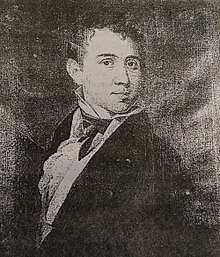Archibald Hamilton (1790–1815)
Archibald Hamilton (c. 1790 – 15 January 1815) was the son of Secretary of the Navy Paul Hamilton, and an officer in the United States Navy during the War of 1812.

Hamilton was appointed Midshipman on 18 May 1809 and assigned to work with a new kind of hollow shot needed by frigate President. He next sailed for Europe in John Adams on 31 January 1811 carrying dispatches for American officers in the Mediterranean. On his return to the United States, Hamilton was assigned to United States on which he won high commendation from his commanding officer, Captain Stephen Decatur, for gallantry in action during the capture of British frigate Macedonian on 25 October 1812. Decatur selected him to bear the captured British flags to Washington.
Appointed Acting Lieutenant 21 December 1812 and Lieutenant 24 July 1813, Hamilton served with distinction throughout the War of 1812, only to be killed shortly after the Treaty of Ghent had formally ended the war. Because of the slow communications of the day, word of peace had not reached New York by 15 January 1815 when frigate President, commanded by Captain Decatur and having Hamilton as one of her lieutenants, ran the blockade out of that port. The next day British men-of-war Endymion, Pomone and Tenedos overtook and captured President after a long and bloody running fight in which Hamilton was killed. He was the last U.S. Navy officer to die in the War of 1812.
Namesake
USS Hamilton (DD-141) was named for him.
See also
References
- This article incorporates text from the public domain Dictionary of American Naval Fighting Ships.